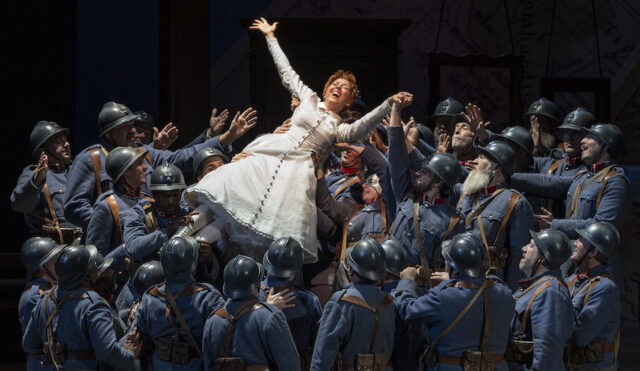
Delightful. No single word better describes the Lyric Opera of Chicago’s current rendition of “The Daughter of the Regiment.” There’s a giddy magic about the production that conjures laughter and applause at every turn and has the audience floating on air.
Donizetti’s beloved French-language comedy tells the tale of Marie, the orphaned “daughter” of a military unit, who defies both the regiment and her long-lost relatives to be with Tonio, the young man she has fallen in love with.
As Marie, Lisette Oropesa appears for all the world to be an impetuous tomboy, dancing gracefully in the upper reaches of her range while flinging herself to the stage in sorrow or being hoisted into the air by dozens of joyous soldiers.
Lawrence Brownlee not only nails the devilishly challenging nine high Cs in the aria “Ah, mes amis,” he blithely repeated the passage to thunderous applause. And Alessandro Corbelli is all bluster and affection as Sulpice, head of the regiment and a foster father to Marie.
The set is a masterpiece of ingenuity, with a “Les Miz” style furniture battlement evaporating to reveal a rolling landscape of military maps, which disappears beneath a spacious room in a grand estate that perches atop it at a dizzying angle.
The orchestra is conducted with precision and verve by Maestra Speranza Scappucci and the entire cast performs with impeccable comic timing under the deft hand of director Christian Räth and choreographer Karine Girard.
Laughter builds as Oropesa, refusing to be separated from her regiment and her love, trudges forlornly across the entire stage dragging an impossibly long line of laundry behind her.
A quartet of cross-dressing maids hilariously tidy the posh estate during the overture to the second act, and Oropesa, Brownlee and Corbelli share a charmingly choreographed trio a la “Good Morning” in “Singin’ in the Rain.”
The regiment is utterly engaging throughout. More than 40 members strong, they move at times as one and with random abandon at others, amplifying whatever mood Donizetti hopes to create, be it comedy or pathos, despair or jubilation.
Even the liner notes are brilliant, offering a fascinating glimpse into a historical context that prompted critics in France to hate the opera and the audiences to love it when it debuted.
This is the sort of production that reminds you that the comic operas of the 19th century were the Broadway musicals of the 1940s. There are still tickets left for the performances on Wednesday, Nov. 22, and Saturday, Nov. 25. I recommend you move heaven and earth to attend.
To order tickets, click here.
 Fra Noi Embrace Your Inner Italian
Fra Noi Embrace Your Inner Italian






